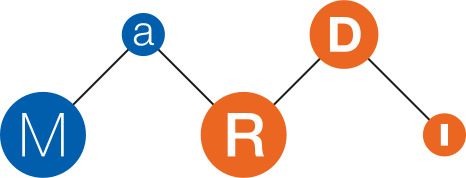
Mathematical Research Data Initiative (MaRDI consortium)
- Contact:
- Startdate:
01.10.2021
- Enddate:
30.09.2026
The goal of the Mathematical Research Data Initiative (MaRDI) is to develop a research data infrastructure that will be of great benefit not only to mathematics, but also to other fields. MaRDI aims to provide standards for verified mathematical research data, reproducible workflows, and services for the scientific community. In doing so, it aims to implement FAIR principles in mathematics and its applications, as well as data processing interoperability, and to drive new research activities.
The volume of data and its rate of creation are increasing dynamically with the rapid unfolding of mathematics in the data sciences and the ever-increasing computational power. In various disciplines such as physics, chemistry, engineering, the humanities, and life sciences, this leads to increasingly complex mathematical models and mathematical research data. MaRDI's four research-motivated pillars include computer algebra, scientific computing, statistics and machine learning, and interdisciplinary mathematics.
Standardized formats and application programming interfaces will be developed for the resulting mathematical research data, and prototype services will be expanded into full services with added research value. MaRDI will develop enhanced information services that include mathematical models as research data, an interdisciplinary mathematical digital semantic atlas, ontologies, and metadata, such as an algorithm metadata library. In addition, a digital service portal will be established as a central point of contact for the scientific community. Sustained implementation of MaRDI's results requires a community based on a FAIR data culture and FAIR research processes. "FAIR" stands for Findable, Accessible, Interoperable, and Reusable. The goal is to optimally prepare research data for people and machines and make it accessible - unhindered and loss-free. To this end, appropriate cooperation platforms are to be developed for knowledge dissemination, scientific discourse and quality assurance.
The consortium
The consortium consists of 15 research institutions of the German mathematical community. German and international associations, such as the European Mathematical Society (EMS), scientific societies, and consulting experts are also involved. It is coordinated by Weierstraß-Institut für Angewandte Analysis und Stochastik, a Leibniz Institute in the Berlin research association.
FIZ Karlsruhe@ MaRDI
In the field of mathematics, FIZ Karlsruhe develops and maintains various information services that are recognized and used by the community worldwide. Their core functions focus on facilitating the indexing and retrieval of bibliographic information, reviews, free full texts, and software. In Task Area 5, FIZ Karlsruhe contributes to the development of the MaRDI portal, networking with its renowned international information services zbMATH Open and swMATH, and through the integration of standardized research data.
Under the umbrella of the MaRDI portal, a customized, cost-efficient and user-friendly service for archiving and publishing research data will be offered in the future. FIZ Karlsruhe‘s research unit Information Service Engineering (ISE) participates in the development and implementation of the MaRDI Knowledge Graph.
